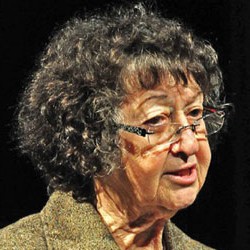April 29th marks the anniversary of the the day American troops liberated the Nazi concentration camp Dachau in 1945. Among those freed was Ann Rosenheck, a woman of great courage and moral character. I had the honor and privilege of interviewing Ann while writing the international best-selling book, The Common Thread of Overcoming Adversity and Living Your Dreams. Her full story can be found in the book, but in the meantime here are some excerpts that will inspire you.
Character is defined as “the mental and moral qualities distinctive of an individual.” We all hope to live a life that is saturated in high grades of character, but the truth is that not all character is created equal. There are some people that just have a special set of qualities that define their inner-fabric and set them apart from the rest. Holocaust survivor Ann Rosenheck is one of those people.
She has had to live with the grief and guilt associated with surviving a tragedy that took over ninety family members, including her mother, father, grandmother, brother and sister. It takes an incredible strength of character to deal with such an experience. We can gain a lifetime of wisdom from Ann and her dynamic life.
Ann was thirteen years old when the Nazis marched in to occupy her small Czechoslovakian town nestled in the Carpathian Mountains. It was 1944, and she was the youngest of five children when her entire family was removed from their home and forced into the ghetto. Shortly thereafter, they were on their way to the infamous concentration camp at Auschwitz. She recalled:
“Josef Mengele, the notorious Angel of Death, told me to go left and directed the rest of my family to go to the right. I walked to the left—to the barracks—but my family was led straight into the gas chamber.”
While at Auschwitz, Ann remembers “waking up every day and thanking God for letting me live through another night.”
The Nazis eventually moved Ann to Dachau, another infamous death camp, where she was forced to work in a munitions plant until American forces liberated the camp on April 29, 1945.
“I remember when I saw that first American soldier—then I knew what it meant to be liberated.” Within a few years, Ann immigrated to the United States, where she lived with an aunt and uncle.
Six million European Jewish people lost their lives in World War II at the hands of Adolf Hitler and his Nazi regime. Over one million children, two million women, and three million Jewish men were murdered. But it didn’t stop there. The total number of Holocaust victims was between eleven million and seventeen million people, including Soviet prisoners of war, Polish and Soviet civilians, homosexuals, people with disabilities, Jehovah’s Witnesses, and other political and religious opponents of Hitler.
Ann Rosenheck has seen the worst of humanity and survived. Her incredible strength, character and inspiration can benefit all of us as we face our own daily challenges. She is a wonderful, caring woman with a perspective and attitude that are nothing less than inspiring.
At our interview, Ann explained why she agreed to meet with me:
“Too many survivors never forgive themselves or others. But bitterness is very ugly; you need to get over things in life. You can’t just hold onto them. What has happened yesterday happened yesterday. If you let yourself, there is always a way to find happiness and peace.”
“I lost my parents as a child—I miss their love. But when I came to America and, at eighteen, married a man I knew as a child, and was reunited with my brother, I began to go on with my life, and it was a beautiful life.”
On dealing with adversity Ann emphasizes, “Believe in something. Believe in God—today may be bad—but God will help you tomorrow.”
Today, Ann remains as optimistic as ever. Currently, she is working with the Foundation for the Holocaust Education Projects to continue bringing Holocaust education and awareness to many communities across the U.S. To learn more, visit holocausteducationprojects.org.
Ann’s strength of character is truly incredible, and her ability to let go of the past and enjoy the present is positively inspiring.
Copyright 2016 Jerry Gladstone

